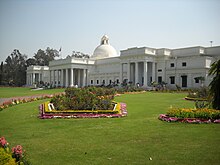| James Thomason | |
|---|---|
 | |
| Lieutenant-Governor of the North-Western Provinces | |
| In office 22 December 1843 – 10 October 1853 | |
| Governors General | The Lord Ellenborough The Viscount Hardinge The Marquess of Dalhousie |
| Preceded by | Sir George Russell Clerk |
| Succeeded by | John Russell Colvin |
| Personal details | |
| Born | (1804-05-03)3 May 1804 Great Shelford, England, United Kingdom |
| Died | 27 September 1853(1853-09-27) (aged 49) Bareilly, United Provinces of Agra and Oudh |
| Alma mater | East India Company College |
James Thomason (3 May 1804 – 17 September 1853) was a British administrator of the East India Company and Lieutenant-Governor of the North-Western Provinces between 1843 and 1853.
Early life
The son of Thomas Truebody Thomason, a British cleric in Bengal from 1808, and his first wife Elizabeth Fawcett, he was born on 3 May 1804 in Little Shelford. He was educated in England from 1814, at Aspenden Hall School, Hertfordshire, where he knew Thomas Babington Macaulay, living with his paternal grandmother Mrs Dornford, and Charles Simeon. Simeon, in Cambridge, his godfather and effective guardian, gave him a great deal of attention.
In 1818 Thomason became a pupil in 1819 at Stanstead Park, near Racton in Sussex, of George Hodson, who was tutoring Albert Way, son of Lewis Way in what became a small class of six boys that included Samuel Wilberforce. He moved on to Haileybury College.
Career in India
James Thomason returned to India in 1822. He held numerous positions there, including magistrate-collector, settlement officer in Azamgarh (1832–37), and foreign secretary to the government of India (1842–43). In 1843 he was named Lieutenant-Governor of the North-Western Provinces, a post he held for ten years. By 1853 he had also established a system of 897 locally supported elementary schools in centrally located villages that provided a vernacular education for children throughout the region. He was appointed as governor of Madras by Queen Victoria, but did not survive to assume the post. He died on 27 September 1853, at Bareilly, India, where he was staying with Maynie Hay, his married daughter.
Legacy

James Thomason proposed that a civil engineering college be established at Roorkee. In 1847, the first civil engineering college in India begun in part to train engineers for the Ganges Canal was opened and named the Thomason College of Civil Engineering in Thomason's memory by Proby Cautley, the designer of the canal. It gained university status in 1949 It is now the Indian Institute of Technology Roorkee.
References
- ^ Howlett, David J. "Thomason, James". Oxford Dictionary of National Biography (online ed.). Oxford University Press. doi:10.1093/ref:odnb/27251. (Subscription or UK public library membership required.)
- Hopkins, Hugh Evan (2012). Charles Simeon of Cambridge. Wipf and Stock Publishers. p. 169. ISBN 978-1-61097-813-2.
- Newsome, David (1993). The Parting of Friends: The Wilberforces and Henry Manning. Gracewing Publishing. p. 40. ISBN 978-0-8028-3714-1.
- Meacham, Standish (1970). Lord Bishop: The Life of Samuel Wilberforce, 1805–1873. Harvard University Press. p. 8. ISBN 9780674539136.
- "James Thomason biography – British colonial governor". Encyclopædia Britannica. Britannica Online. Retrieved 1 March 2015.
- "History, Indian Institute of Technology Roorkee".
Further reading
- The India List and India Office List. Harrison. 1819.
- Richard Temple (February 2006). James Thomason — Lieutenant-Governor. Rulers of India series. Read Books. ISBN 978-1-84664-413-9.
| Government offices | ||
|---|---|---|
| Preceded bySir G. R. Clerk | Lieutenant Governor of North-Western Provinces 22 December 1843 – 10 October 1853 |
Succeeded byA. W. Begbie (acting) |
Categories: